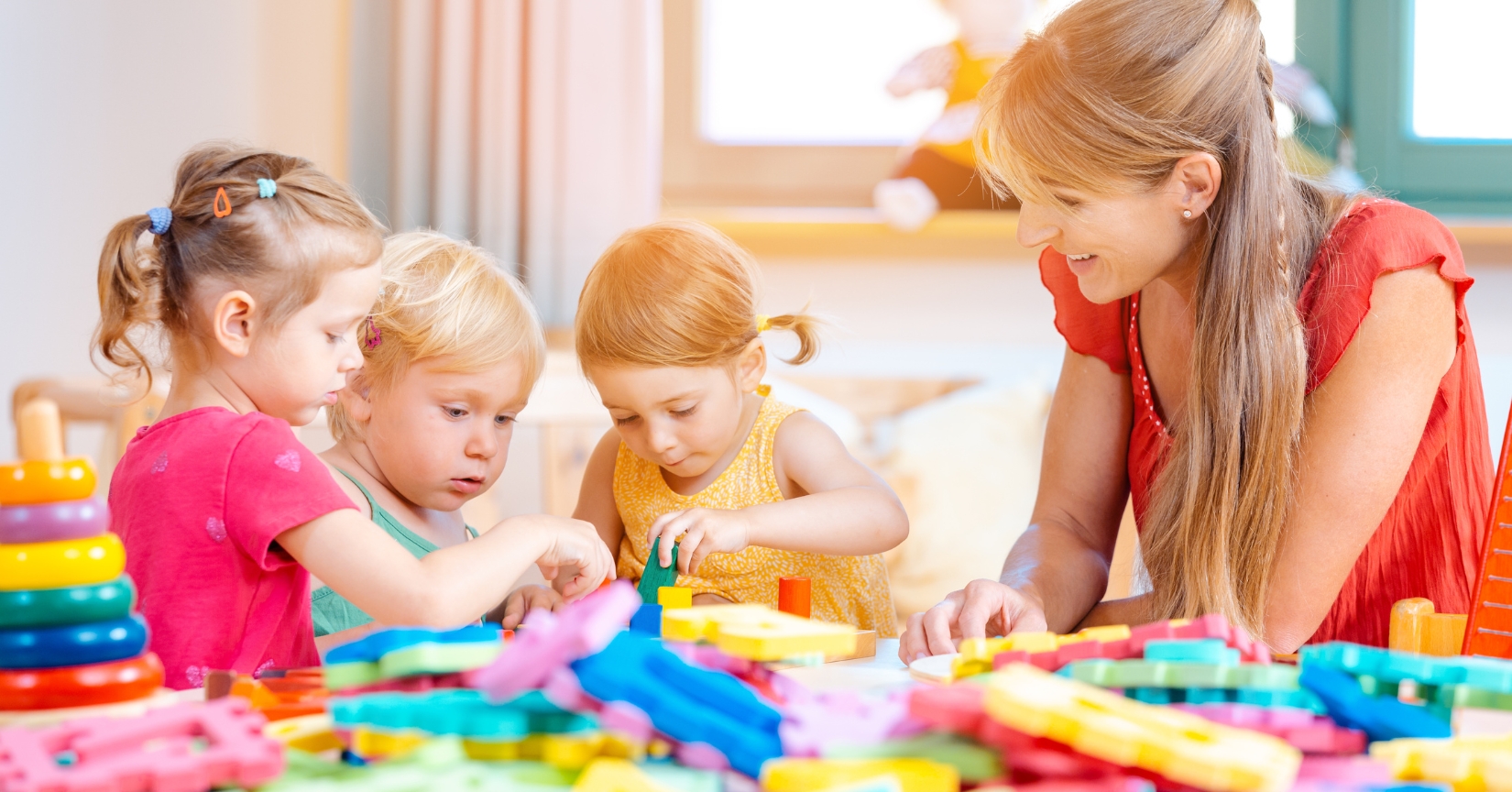Every child is a world of possibilities, but it’s the early years that shape their futures the most.
When you think of that one teacher from your preschool who left an indelible mark on your life, what characteristics come to mind? Patience? Creativity? Or maybe a sense of humor?
Being a preschool teacher is no easy task. It takes more than just knowing how to read and write. It’s about nurturing young minds, sparking curiosity, and creating a safe and encouraging environment where they can grow.
After years of observing, interacting with, and learning from some truly outstanding preschool teachers, I’ve managed to distill what I believe are the key traits that set the best apart from the rest.
So whether you’re an aspiring teacher seeking to make a difference, a parent looking for the right educator for your child, or just someone curious about what makes a great preschool teacher, here are 7 traits that the best preschool teachers possess.
1. Unwavering patience
A preschool classroom can be a whirlwind of activity. From the child who insists on wearing his shoes on the wrong feet, to the one who can’t help but interrupt story time with her latest discovery, there’s never a dull moment.
It’s in these moments that the best preschool teachers shine. They have an unwavering patience that seems to be as deep as the ocean. It’s not just about tolerating the noise, the mess, or the constant need for attention – it’s about understanding that these are all part of a child’s learning process.
The best teachers are those who can stay calm and composed, even when faced with a room full of energetic preschoolers. They take every interruption, every question, every little mishap in stride, seeing each as an opportunity to teach and to learn.
They understand that patience isn’t just waiting for a child to get something right. It’s giving them the time and space they need to explore, make mistakes, and learn at their own pace. Because in the end, it’s not rushing towards a finish line – it’s enjoying and learning from the journey.
2. Embracement of chaos
When you walk into a preschool classroom, what do you expect to see? Rows of neatly lined up desks? Quiet children engrossed in their books? If that’s the case, then you might be in for a surprise.
The best preschool classrooms are often filled with what might seem like chaos. Children running around, toys scattered all over the floor, paint splatters on the walls, and amidst all this, a teacher who seems to be completely at ease.
While it might seem counterintuitive, this ability to embrace chaos is actually one of the key traits that the best preschool teachers possess. They understand that creativity and learning often come in messy packages. They know that for children to explore their full potential, they need an environment where they feel free to make mistakes and get messy.
These teachers don’t try to suppress the natural energy and curiosity of their students. Instead, they channel it into constructive activities and learning experiences. They know when to step in and provide guidance, and when to step back and let the children discover things on their own.
So don’t be fooled by the apparent disorder. In reality, it’s a sign of a vibrant, active, and engaging learning environment – one where every child gets to be themselves and learn in the way that suits them best.
3. Infectious enthusiasm
Have you ever noticed how a child’s face lights up when they’re truly excited about something? That infectious enthusiasm can be a powerful tool in a preschool teacher’s arsenal.
The best preschool teachers are those who are passionate about their work and about the subjects they teach. They bring an energy and excitement to the classroom that is downright contagious. They could be teaching about shapes, colors, animals or even something as simple as how to tie a shoelace – but they do it with such fervor that the children can’t help but get caught up in it.
Their eyes sparkle with excitement as they introduce new concepts and activities. They express genuine joy when a child grasps a new concept or skill. Their enthusiasm often spills over, kindling a love for learning in their students.
This level of enthusiasm not only makes learning fun, but it also helps to instill a positive attitude towards education in the children. After all, if their teacher is so excited about learning, it must be something worth getting excited about, right?
4. Master storytellers
Did you know that storytelling is one of the oldest forms of teaching? Long before books and schools, ancient civilizations used stories to pass down knowledge and wisdom from one generation to the next.
Great preschool teachers understand the power of a well-told story. They are master storytellers, able to weave tales that captivate their young audience. Whether it’s a story about the life cycle of a butterfly, or a tale about sharing and kindness, they deliver it in a way that the children can understand and relate to.
They use voices, gestures, props, and even their own facial expressions to bring their stories to life. They know how to pace their narration, when to pause for effect, and how to use repetition to reinforce key points.
It’s about telling stories and also encouraging children to share their own narratives. This helps develop their language skills, as well as boosting their confidence and creativity.
So, while they may not have a campfire or ancient runes, these preschool teachers are keeping alive the age-old tradition of teaching through storytelling – and creating memorable learning experiences in the process.
5. Unconditional acceptance
Picture a child, paint smeared across their face, hands covered in dirt, hair sticking out at all angles. To some, this might be a sight for concern. But to a great preschool teacher, this is just another day at the office.
One of the most profound traits of an exceptional preschool teacher is their ability to accept each child as they are. They understand that every child is unique, with their own strengths, weaknesses, quirks, and eccentricities.
They don’t try to fit the children into neat little boxes or compare them against each other. Instead, they celebrate these differences. They provide a safe space where each child can be themselves without fear of judgment or criticism.
This unconditional acceptance extends not just to the children’s personalities, but also to their ideas and creations. A squiggly line might not look much like a cat to an adult, but to the child who drew it, it could be the most perfect cat in the world. And that’s all that matters.
In showing this acceptance, they teach the children one of the most valuable lessons of all – that it’s okay to be yourself. And in a world that often demands conformity, this is a lesson that will serve them well throughout their lives.
6. Professional learners
When you think of a teacher, you might picture someone who’s all-knowing, someone who has all the answers. But the reality is, the best preschool teachers are those who see themselves not just as teachers, but as learners too.
Contrary to what many might think, teaching isn’t just about imparting knowledge. It’s about being open to learning – from colleagues, from experiences, and most importantly, from the children themselves.
Great preschool teachers know that every day in the classroom is an opportunity for them to learn something new. Whether it’s a new way to explain a concept, a fresh perspective on a familiar topic, or even a life lesson from a four-year-old’s innocent remark – they’re always eager to learn.
They don’t see questions as challenges to their authority, but as opportunities to explore and discover together with the children. They’re not afraid to say “I don’t know, let’s find out together.”
Their willingness to learn and grow sets them apart, demonstrating to the children the true essence of learning: it’s an ongoing journey rather than a destination.
7. Creators of safe spaces
Imagine being a small child, stepping into a preschool classroom for the first time. It’s a whole new world, filled with unfamiliar faces, new rules, and strange surroundings.
In this unfamiliar territory, what the child needs most is a sense of safety and security. And that’s exactly what the best preschool teachers provide.
They create an environment where children feel safe – not just physically, but emotionally as well. They establish clear boundaries and consistent routines, which provide the children with a sense of stability and predictability.
Creating a safe physical environment is important, but equally vital is establishing a safe emotional space. A space where children feel comfortable expressing their thoughts and feelings, knowing they’ll be heard and understood.
These teachers are sensitive to the children’s needs and emotions. They’re quick to offer comfort when a child is upset, praise when they’ve done well, and gentle guidance when they’re struggling.
By creating this safe space, they allow the children to step out of their comfort zones, take risks, and explore their full potential – secure in the knowledge that they have a safe base to return to.
More than just a job
At first glance, being a preschool teacher might seem like a series of tasks – reading stories, leading activities, managing snack times, and so on. But in reality, it’s much more than that. It’s a calling, a commitment, a labor of love.
Preschool teachers are the custodians of children’s earliest learning experiences. They’re the ones who lay the foundation upon which the rest of a child’s education – and indeed, their life – will be built. They are responsible for cultivating curiosity, fostering creativity, and instilling a love for learning that will hopefully last a lifetime.
They’re not just teaching ABCs and 123s. They’re teaching children how to navigate the world around them. How to solve problems, how to work in a team, how to be kind and respectful to others. They’re helping children discover who they are and what they can become.
But the impact of a preschool teacher goes beyond the classroom. They often become role models for the children – figures of trust and respect that they look up to. The lessons they impart, the values they uphold, and the behavior they model all leave an imprint on the children’s minds.
Preschool teachers also play an important role in supporting parents. They offer guidance and reassurance, helping parents navigate the often challenging early years of parenthood. They become partners in raising the child, sharing in the joys and challenges of their growth and development.
Being a preschool teacher is not for the faint-hearted. It requires dedication, patience, creativity, resilience – as we’ve discussed earlier – and so much more. It’s a job that demands everything you’ve got, but also gives back in ways that are immeasurable.
In summary, the qualities of a great preschool teacher extend beyond skills or knowledge. They encompass passion, empathy, and a profound understanding of children’s needs. It’s the ability to perceive the world from a child’s viewpoint and to foster an environment conducive to their growth. Above all, it involves acknowledging the uniqueness of every child and adapting teaching methods to suit their individuality.
Being a preschool teacher is indeed a noble profession – one that shapes not just the minds, but also the hearts of our future generations.









